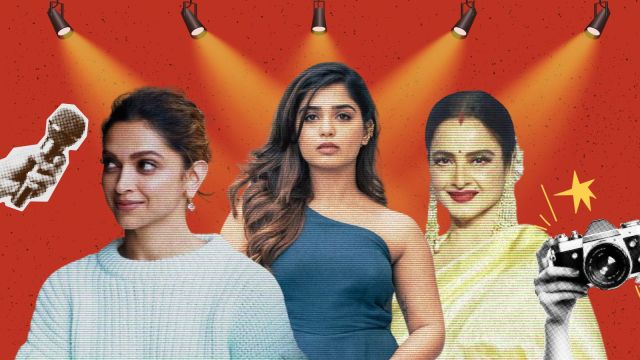Women celebrities are done with ‘fun’ questions, they are answering back
Actor Gouri G Kishan’s response to an inappropriate question from a YouTube vlogger highlights a dual reality: women continue to face sexist, intrusive queries, but they are also pushing back with increasing clarity and confidence.
 Women of all times have endured blatant invasion of their privacy in one form or another. In photo: Deepika Padukone, Gouri G Kishan, and Rekha. (Credits: Instagram/Twitter/APH images)
Women of all times have endured blatant invasion of their privacy in one form or another. In photo: Deepika Padukone, Gouri G Kishan, and Rekha. (Credits: Instagram/Twitter/APH images)Earnest words of support and many laudatory messages were sent Gouri G Kishan’s way after a video of the young actor emerged on the internet recently, showing her calmly calling out YouTuber R S Karthik for asking inappropriate questions about her weight. This happened at a press conference during the promotions of a Tamil film, Others.
A few days later, Karthik appeared to have an outburst and offered what seemed like a halfhearted apology. Instead of owning up to his wrongful conduct, he said he was sorry if his “fun” questions had hurt anyone.
Promptly, Gouri called out the apology too, and refused to accept it when the man did not take responsibility for his action. She tweeted: “An apology without accountability isn’t an apology at all. Especially when it’s brushed off with ‘she misunderstood the question — it was just a fun one,’ or worse — ‘I didn’t body-shame anyone.’ Let me be clear. I won’t accept performative remorse or hollow words. Do better, RS Karthik.”
An apology without accountability isn’t an apology at all.
Especially when it’s brushed off with “she misunderstood the question — it was just a fun one,” or worse — “I didn’t body-shame anyone.”
Let me be clear. I won’t accept performative remorse or hollow words. Do better, RS… https://t.co/OsIOegL9Hr— Gouri G Kishan (@Gourayy) November 10, 2025
Gouri’s response at the presser stood out for multiple reasons. One, that she had no qualms calling the man out when the rest of her team stayed mum. Two, she never lost her cool, unlike her quizzer, who went into a tirade, quoting his years of experience and name-dropping actors he had asked similar questions of. Gouri waited for him to finish before patiently taking the mic and letting him know it was a stupid question — an adjective she would later call inadequate.
It wasn’t a knee-jerk reaction. She stood her ground even when she was cornered in a room full of male journalists, and she had to fight her battle alone. Women celebrities in various fields and in every part of the world have faced such derogatory remarks on the pretext of “fun questions”. It’s sadly neither new nor shocking. However, with the heightened awareness spreading on gender sensitivity and political correctness, it is a question why journalists, who are expected to be more in the know than your average Joe, should continue to stoop to such levels.
The #MeToo movement broke out eight years ago, with woman after woman exposing decades of sexual harassment, setting off many court cases and sending at least some of the offenders to prison. In the aftermath, threads of caution appeared to wrap around those with murky pasts and abusive tendencies. Loose tongues were tucked inside, wandering limbs kept in check. Initiatives like the Hema Committee, formed in Kerala to study the issues of women in cinema, set new standards against harassment.
All of it did make a difference. If it didn’t, the vlogger humiliating a woman actor would not face the kind of backlash he did or be forced to give even this insincere apology. Sensitisation is often a slow process, but thanks to a volatile social media, the reactions are quicker, massive and impossible to ignore.
The appreciation Gouri received is in itself noteworthy in a society that has been conditioned for ages to frown upon women who talk back, especially to an older male. Only, it appears to come more alive on the internet and at a later time than in person. Could this have anything to do with gender? Take a look at recent examples.
Weeks ago, actor Sarath Kumar was applauded when he was on the stage, taking the mic to defend his colleague Pradeep Rangathan, who was asked an unflattering question about his looks. This happened during another promotional press meet for the Tamil film Dude. Sarath Kumar, who is also a politician, gave a fitting reply and was met with instant applause — a gesture that was absent in Gouri’s press conference.
Earlier this year, actor and anchor Aishwarya Raghupati reacted sharply to a male reporter’s question about her sari during the promotional event of a film. Though he framed his question in a way that seemed to address summer heat, Aishwarya said she realised only later that he was referring to her choice of wearing a sleeveless blouse with a cotton sari. While she refused to answer his question, she went on to criticise the journalist at another stage, a few weeks later. On this occasion, too, however, she was bombarded with a flurry of questions from other journalists reproachful of her criticism.
In another such exchange in 2023, the tables had turned when a woman reporter took offence at the actions of male superstar and politician Suresh Gopi during a media interaction. In the video of the event, he was seen laying his hands on her shoulder, even after she had once shaken herself free. The incident snowballed into a controversy and a police case, and another apology that was neither here nor there. None of the male journalists standing alongside had intervened at the time. They would, however, burst into laughter when Suresh Gopi made a fuss about it in later media interactions. He’d jokingly say “no touching” or else rest his hands on a male reporter’s shoulder and ask him, “You don’t mind, do you?” Only the lone woman among them would protest while the men laughed.
Women of all times have endured this sort of blatant invasion of their privacy in one form or another. Senior actor Urvashi was once asked personal and offensive questions by an anchor who, apparently disappointed by her matter-of-fact response, blurted out that he had expected her to break down into tears. Another veteran, Shobana, silenced a male interviewer who began to pry into her personal life by simply reminding him he was told not to ask such questions, with a smile on her face.
Even women anchors can partake in this voyeuristic media culture. In a ‘rendezvous’, Bollywood’s darling Rekha was pressed to speak about her marriage plans with a man. With her trademark smile, she asked back, “Why not a woman?’ These were times before LGBTQI+ rights were so discussed or accepted.
View this post on Instagram
Globally, icons like Jennifer Aniston, Madonna and Britney Spears have all been asked awkward or deeply personal questions about their sex life or bodies, or else shown lewd gestures, even by celebrated journalists.
And calling out the wrong questions on the spot is not at all an easy thing to do. Some celebrities are left stunned. Some try to laugh it off uncomfortably, or simply resort to politely refusing to answer the question.
View this post on Instagram
Consider the case of Lady Diana. Her fatal crash occurred while her car was being pursued by paparazzi intent on capturing private moments, a stark example of how relentless media intrusion can have devastating consequences.
But times have changed. Women celebrities are no longer expected to smile through the disrespect. They are celebrated for their spontaneous clapbacks — whether it’s Alia Bhatt retorting on the spot when the umpteenth journalist made fun of her general knowledge after a goof-up in Koffee with Karan, or Deepika Padukone calling out a mainstream newspaper for repeatedly publishing revealing pictures of her, or Nikhila Vimal, who has become known for her smart replies to silly questions. Perhaps as more women answer back, the industry will be forced to rethink not just how questions are asked, but why certain questions are asked at all.
Cris is a feature writer based in Kerala.
Photos


- 01
- 02
- 03
- 04
- 05





























